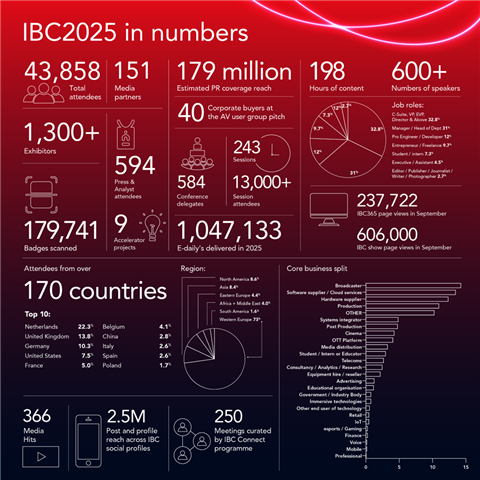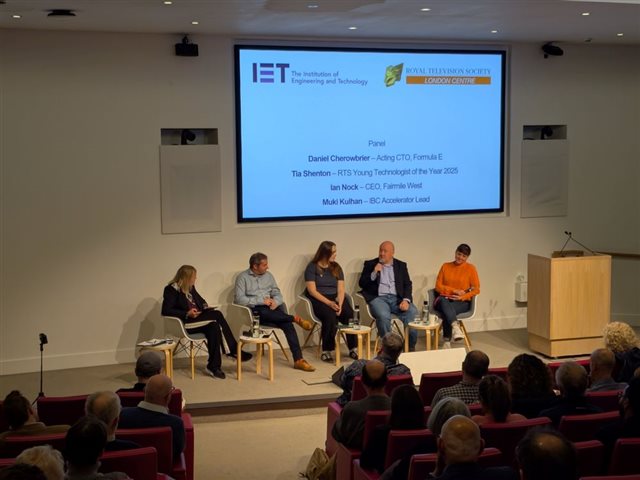Blog Post by Central London Network volunteer Phil Snuggs
How are we shaping the future of entertainment and technology?
The October Central London Network Evening Lecture was a Panel review in partnership with the Royal Television Society London Network. The topic was the recent IBC2025 show, a global event for the media, entertainment, and technology industry.
The Panel in the Turing Lecture Theatre was chaired by Nadine Dereza, Broadcaster & Journalist.
Her fellow Panel members were:
- Dan Cherowbrier – Acting CTO Formula E
- Muki Kulhan – IBC Accelerators Lead
- Ian Nock – CEO Fairmile West and vice chair IET Media Technical Network
- Tia Shenton – RTS Young Technologist of the Year 2025
The panel recounted how IBC 2025 was attended by 43,858 visitors and had 1,300 exhibits. It was evident at IBC that the theme centred around content creation which was abundant in the halls. IBC traditionally displayed hardware and new products, this was replaced with tangible evidence of AI backed up with use cases. IBC 2025 demonstrated Interoperability, Flexibility and AI driven products.
Hall 14 contained the latest ideas, demonstrating how the industry has leaped forward into a software driven world and there was an absence of hardware boxes.

image from IBC website
Key IBC Accelerators projects included:
- AI
- Cloud
- OTT
- Streaming
- Immersive technologies
AI
The panel discussed how AI was now demonstrating tangible workflows and was now surging forward. Agentive AI is used in speech process and voice recognition. Interoperability uses agentive AI on software defined platforms.
Accelerator projects have professional proof of concept and demonstrating regenerative for AI.
Directors are using AI for scripting content using LLM (Long Language Model).
AI is used extensively for content by NHK using key attributes for tagging metadata, and Audio Description (AD).
Shure Microphones uses AI for voice detection, and this did not have a negative impact on the workforce. In fact, more jobs were being created using AI applications.
AI in content optimised coding resulting in improved bit rate, use of new tools had a marked improvement in video making. Quality was improved for 1080i format in the cloud.
Cloud
Huge financial savings are realised using offsite support in Google cloud. Formula E has demonstrable framework for compliance. This is also used to train drivers and obtain telemetry data.

Remote production was evident, being able to create and deliver IP based operations at the site. This provided huge savings on staff costs. Latency in the cloud does have an impact and is important but offset by financial saving for the production/operation.
Investment in software defined workflows, integrating new cloud workflows considering latency and synchronisation. 5G in a box played an important catalyst trading off latency with remote production.
Standards and protocol are either defined or evolve. Coding is defined in:
- Online streaming
- Protecting IP
- Collaboration
Closing Points
An important closing statements from the panel:
Upskilling an aging work force in broadcast require more young people in the industry to maintain this field. How do we transfer knowledge from 50-60 year olds to the younger generation.
It was evident at IBC there was a younger attendance, but we need apprenticeships and internships to attract the young workforce. What do you think? Let us know in the comments below and please follow the Central London Network on X (Twitter) and Facebook.
Watch the Lecture on IET TV here:
https://tv.theiet.org/?videoid=18332
Did you know that Savoy place has a 24/7 webcam? https://www.theiet.org/about/our-venues/iet-london-savoy-place-webcam
-

David Tabor
-
Cancel
-
Vote Up
0
Vote Down
-
-
Sign in to reply
-
More
-
Cancel
Comment-

David Tabor
-
Cancel
-
Vote Up
0
Vote Down
-
-
Sign in to reply
-
More
-
Cancel
Children